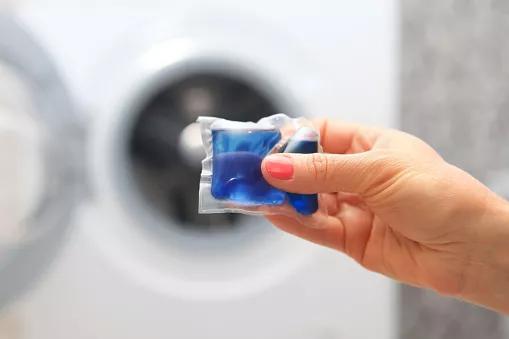Talk to kids about these health risks

Image content: This image is available to view online.
View image online (https://assets.clevelandclinic.org/transform/0ec110cf-bdb8-44cc-a847-9213f859835c/GettyImages-903873120_jpg)
Laundry Detergent Pod 'Challenge' Risks to Teens
Laundry detergent pods, with their colorful, bright swirls, look like candy, so a young child might wonder if they taste like candy too. Parents know to keep these pods away from kids under age 5. What’s more surprising is a recent trend among some teens who are biting into the rounded pods as some kind of stunt or “challenge.”
Advertisement
Cleveland Clinic is a non-profit academic medical center. Advertising on our site helps support our mission. We do not endorse non-Cleveland Clinic products or services. Policy
Experts say there is a rise in cases of teens deliberately putting the packets into their mouths, recording video and sharing it on the internet through social media. As a result, the number of teens in need of medical treatment after such stunts is on the rise.
There have been other such challenges, involving inhaling cinnamon, burning the skin with salt and ice and now biting into laundry detergent pods.
In the spirit of the dare, of pushing limits and challenging their peers, teens often don’t fully recognize the risks they are taking.
Pediatrician James Mandelik, MD, says that the laundry packets are made up of a highly concentrated formula that can do a lot of damage. Ingesting laundry pods can cause burns to the mouth and eyes, as well as more serious complications.
“These pods contain surfactants that help remove stains in laundry. But in the lungs, they can cause a person to have trouble breathing; they can cause the lungs to fill up with fluids and go into full-blown respiratory arrest,” Dr. Mandelik says.
Ingesting laundry pods has also been associated with the following:
Over the last five years, poison control centers have received more than 50,000 calls in connection with liquid laundry detergent pod exposures, with most of the events involving young children under age five.
Advertisement
Recently, the problem of teen injury due to ingesting laundry detergent pods has spiked. Poison control centers report that within the first few weeks of January, they have handled as many cases of intentional laundry detergent packet ingestion among teens as they would typically see in an entire year.
Dr. Mandelik says parents need to be vigilant if they have these items in their home, and they also need to have frank discussions with their older children.
“They aren’t putting laundry pods into their mouths by accident. They’re doing this on a dare,” he says.
He suggests talking to teens and letting them know about the seriousness of the risks.
“Let them know, say, ‘Hey, this is not a benign thing. It’s not just that you’re going to taste something bad, but you could harm yourself permanently or even kill yourself,’” he says.
He adds that people should act quickly if they suspect exposure. “If you find any person has misused a laundry detergent packet or any such concern, call 9-1-1 immediately.”
Advertisement

Sign up for our Health Essentials emails for expert guidance on nutrition, fitness, sleep, skin care and more.
Learn more about our editorial process.
Advertisement
Bathing once a day is the general guidance, but you could also have reasons to soap up twice a day or not at all
You’re sharing your sheets with dust mites, bacteria and lots of dead skin, so you’ll want to keep your bedding fresh
You may notice itching, redness and swelling after wearing or using laundered items
We don’t fully understand how cleanliness impacts immune system development, but we do know that preventing illness is important
An icy blast may boost mental clarity, increase circulation and give your skin a little glow — but don’t overdo it
This olive oil-based soap is generally mild and safe when diluted
It’s a wash — when you bathe is a personal preference
Try turning the heat down on the water and opting for a moisturizing soap
Although it could be used as a moisturizer, this new trend is not recommended
Communicating clear limits helps protect your time, energy and emotional well-being
High cholesterol can be genetic, but testing and treatment can lower your heart disease risk